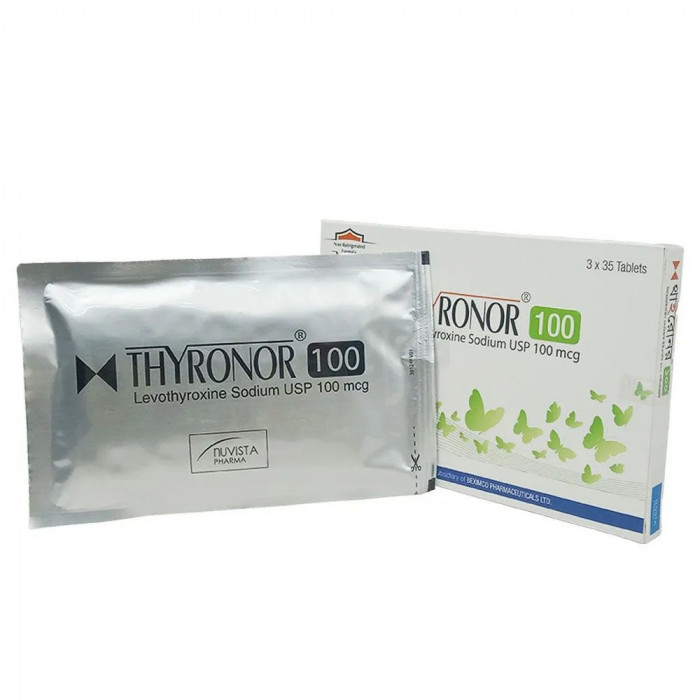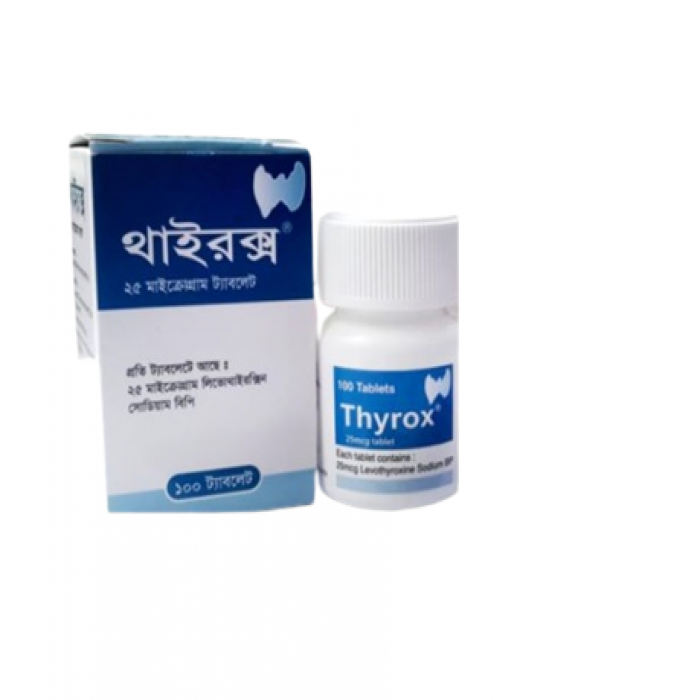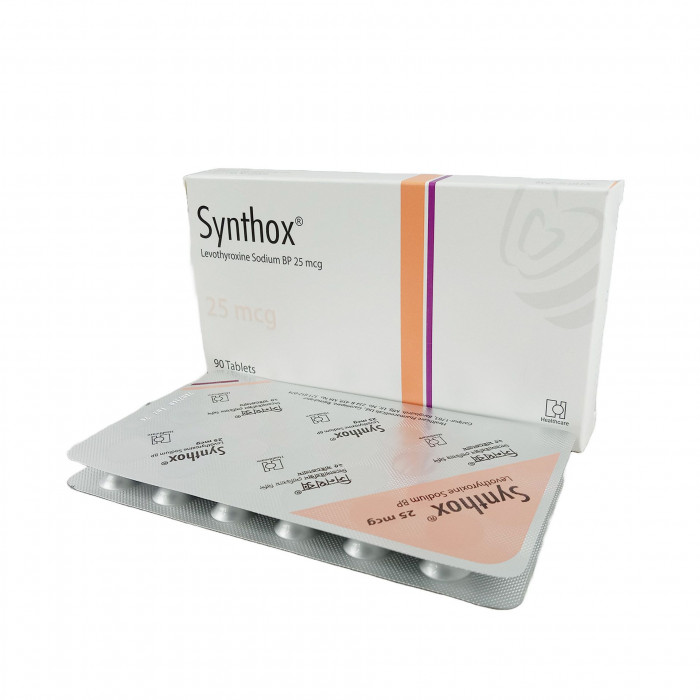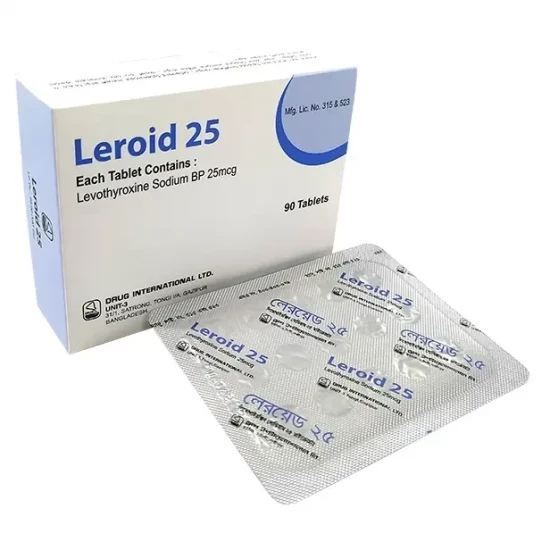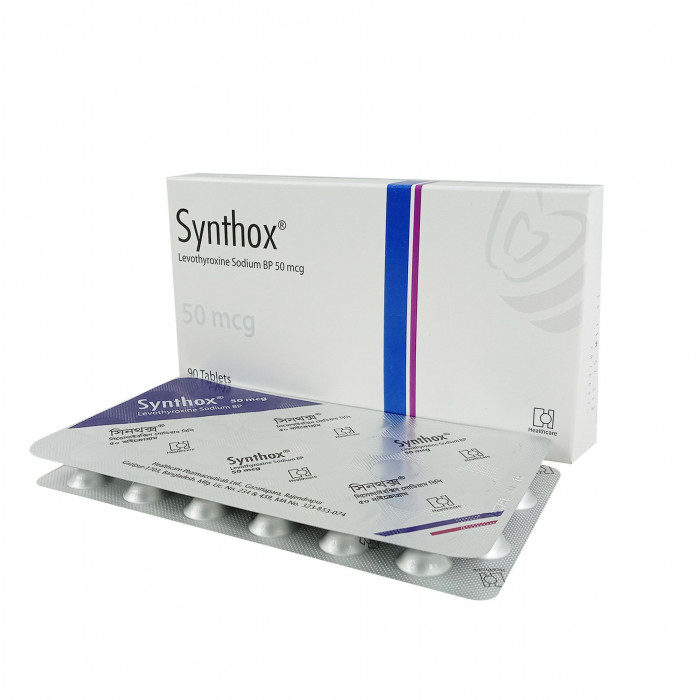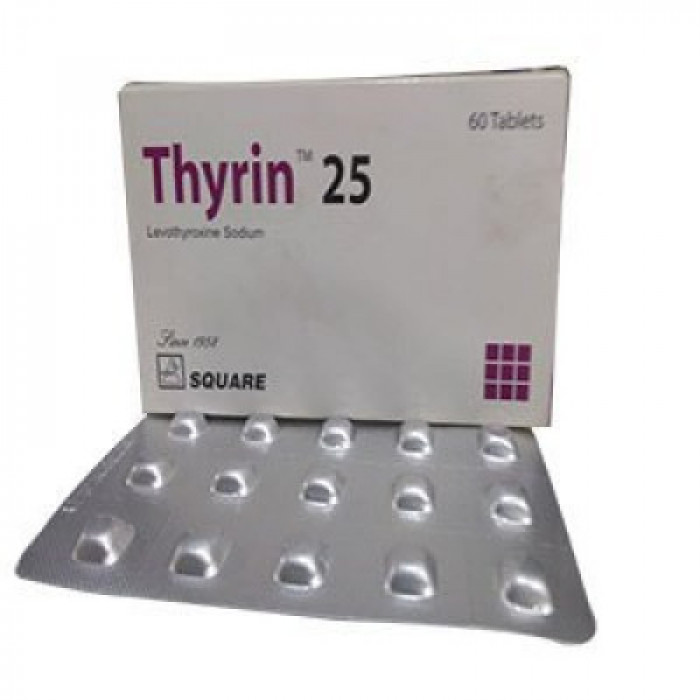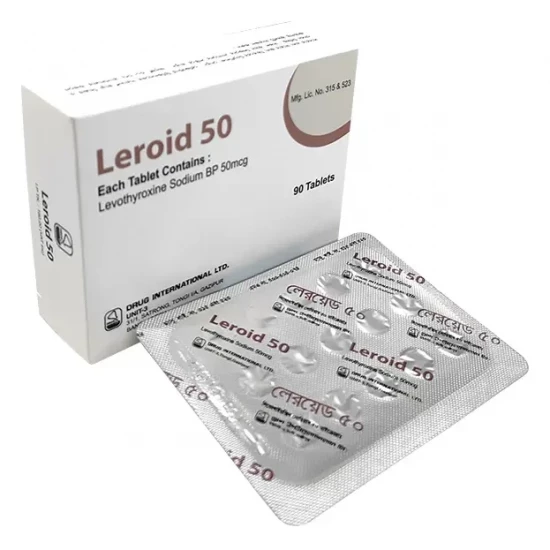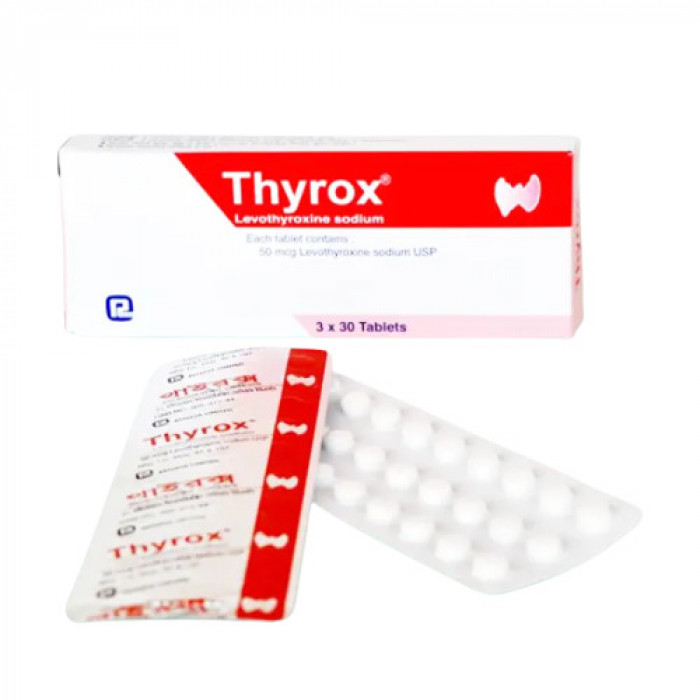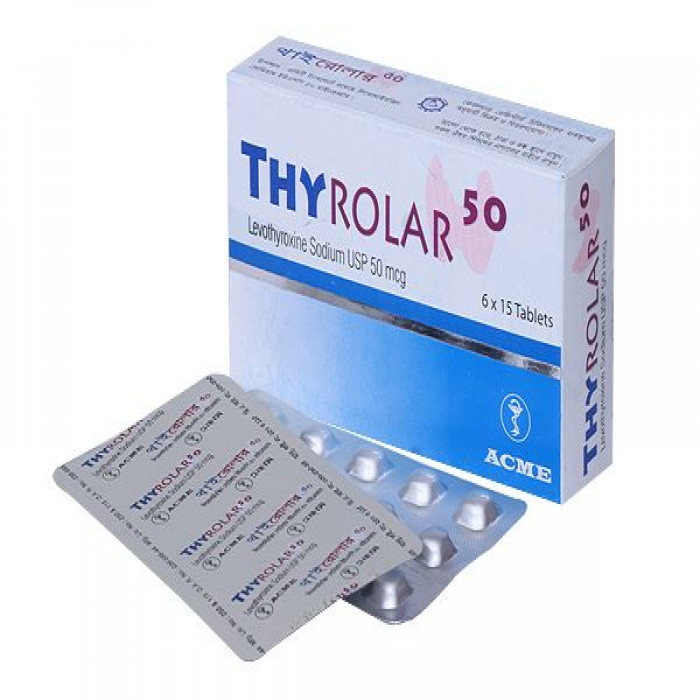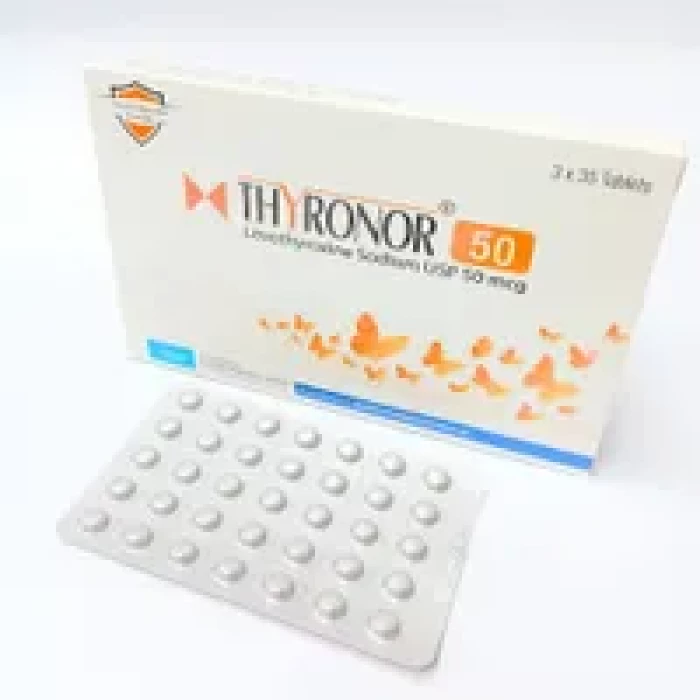
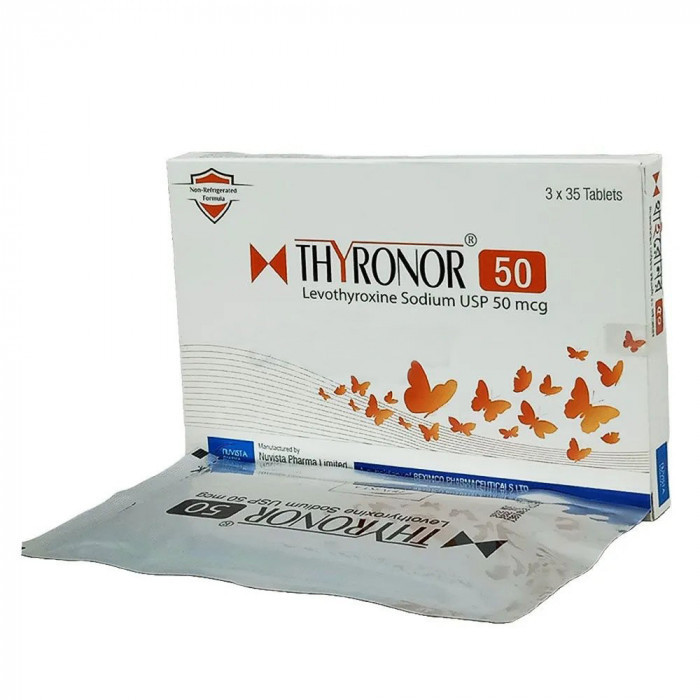
✔ 100% Authentic Product
👁️ Currently Viewing 4771
Thyronor 50mcg Tablet 1 Strip
Thyronor contains synthetic Levothyroxine (T4), which mimics the body’s natural thyroid hormone. In peripheral tissues, T4 is converted into Triiodothyronine (T3), the more active form. T4 binds mainly to Thyroxine-Binding Globulin (TBG), which prolongs its half-life by protecting it from metabolism and excretion.
Half-life of T4: 6–7 days (shortened in hyperthyroidism; prolonged in hypothyroidism).
Liver metabolism: Major site of hormone breakdown, with excretion via urine after conjugation.
Enterohepatic circulation helps maintain blood levels.
A once-daily dose maintains stable T3 levels due to the long half-life of T4.
Discount
Price: ৳ 78
MRP:
৳
80
2%
Off

100% Genuine Products, Guaranteed

Safe & Secure Payments, Always

Fast, Secure & Efficient Delivery

Proper Packaging
 Cash on Delivery - All over Bangladesh
Cash on Delivery - All over Bangladesh Regular Delivery - 12-24 Hours, Dhaka City* Charge Tk.39-59
Regular Delivery - 12-24 Hours, Dhaka City* Charge Tk.39-59 Regular Delivery - 24-48 Hours, Other Cities* Charge Tk.99-110
Regular Delivery - 24-48 Hours, Other Cities* Charge Tk.99-110
🌙 রমযান অফার 🌙
 ফ্রি ডেলিভারিঃ - ৭৯৯ টাকা+ অর্ডারে, ঢাকা
শহরে
ফ্রি ডেলিভারিঃ - ৭৯৯ টাকা+ অর্ডারে, ঢাকা
শহরে ফ্রি ডেলিভারিঃ - ২৭৯৯ টাকা+ অর্ডারে, ঢাকার
বাহিরে
ফ্রি ডেলিভারিঃ - ২৭৯৯ টাকা+ অর্ডারে, ঢাকার
বাহিরে
📲 মোবাইল অ্যাপ অর্ডারে সাশ্রয় বেশী
-
Google Play Store থেকে ডাউনলোড
-
Apple Store থেকে ডাউনলোড
100% Genuine Products, Guaranteed
Safe & Secure Payments, Always
Fast, Secure & Efficient Delivery
Proper Packaging
 Cash on Delivery - All over Bangladesh
Cash on Delivery - All over Bangladesh Regular Delivery - 12-24 Hours, Dhaka City* Charge Tk.39-59
Regular Delivery - 12-24 Hours, Dhaka City* Charge Tk.39-59 Regular Delivery - 24-48 Hours, Other Cities* Charge Tk.99-110
Regular Delivery - 24-48 Hours, Other Cities* Charge Tk.99-110 ফ্রি ডেলিভারিঃ - ৭৯৯ টাকা+ অর্ডারে, ঢাকা
শহরে
ফ্রি ডেলিভারিঃ - ৭৯৯ টাকা+ অর্ডারে, ঢাকা
শহরে ফ্রি ডেলিভারিঃ - ২৭৯৯ টাকা+ অর্ডারে, ঢাকার
বাহিরে
ফ্রি ডেলিভারিঃ - ২৭৯৯ টাকা+ অর্ডারে, ঢাকার
বাহিরে- Google Play Store থেকে ডাউনলোড
- Apple Store থেকে ডাউনলোড
🌙 রমযান অফার 🌙
📲 মোবাইল অ্যাপ অর্ডারে সাশ্রয় বেশী
✅ Description:
Thyronor (Levothyroxine Sodium)
Therapeutic Class: Thyroid hormones and hormone replacement therapy
- Primary treatment for hypothyroidism of any origin (except during transient hypothyroidism recovery, such as in subacute thyroiditis).
- TSH suppression therapyis used in conditions like goiter, thyroid nodules, and post-treatment of thyroid cancer (surgical or radiological).
- Counteracts drug-induced goiter, e.g., from lithium therapy.
- Diagnostic use in TSH suppression tests.
রেজিস্টার্ড চিকিৎসকের পরামর্শ মোতাবেক ঔষধ সেবন করুন।
✔️ Dosage & Administration of Thyronor 50mcg Tablet
Adults
Initial dose: 25–50 mcg/day
Adjustment: Increase by 12.5–25 mcg every 6–8 weeks until clinical and TSH normalization
Severe hypothyroidism: Start with 12.5–25 mcg/day, titrate every 2–4 weeks based on response
Secondary/Tertiary hypothyroidism: Titrate to normalize free T4 within the upper normal range
Patients >50 or <50 with heart disease: Start at 1.7 mcg/kg/day
Pediatrics
Newborns: 10–15 mcg/kg/day (lower dose if risk of heart failure)
Infants with serum T4 <5 mcg/dL: Start at 50 mcg/day
Children with chronic/severe hypothyroidism: Begin with 25 mcg/day, increase every 2–4 weeks
Hyperactivity caution: In older children, start at ¼ the full dose, increase weekly
| Age Group | Recommended Dose |
|---|---|
| 0–3 months | 10–15 mcg/kg/day |
| 3–6 months | 8–10 mcg/kg/day |
| 6–12 months | 6–8 mcg/kg/day |
| 1–5 years | 5–6 mcg/kg/day |
| 6–12 years | 4–5 mcg/kg/day |
| >12 years (growth incomplete) | 2–3 mcg/kg/day |
| Growth and puberty complete | 1.7 mcg/kg/day |
Adjust dosage according to clinical and laboratory evaluations.
✔️ Overdose Effects
Signs mimic hyperthyroidism: Agitation, confusion, tremors, tachycardia, arrhythmias, hyperthermia, diarrhea
Severe cases: Shock, coma, or death
Symptoms may be delayed for days
Management: Discontinue therapy temporarily and provide symptomatic support
✔️ Side Effects of Thyronor 50mcg Tablet
Typically due to overdosage or hyperthyroidism:
General: Fatigue, heat intolerance, weight loss, increased appetite
CNS: Headache, nervousness, insomnia, mood changes
Cardio: Palpitations, arrhythmias, elevated BP
GI: Nausea, diarrhea, abdominal cramps
Musculoskeletal: Muscle weakness, tremor
Other: Hair loss, excessive sweating, flushing
✔️ Use in Pregnancy & Lactation
Pregnancy Category A
Dose adjustments may be necessary during pregnancy.
Minimal excretion into breast milk; safe during lactation with adequate replacement to support normal lactation.
✔️ Drug Interactions
- May increase the effects and toxicity of tricyclic or tetracyclic antidepressants.
- Sertraline may raise levothyroxine needs.
- Insulin and antidiabetic agents may require dose increases.
- Digitalis glycosides: Effectiveness may reduce as thyroid status normalizes.
✔️ Contraindications
- Untreated or subclinical thyrotoxicosis
- Acute myocardial infarction
- Untreated adrenal insufficiency
✔️ Precautions & Warnings
In cases of pituitary-induced hypothyroidism, check and treat adrenal insufficiency before starting levothyroxine.
Cardiac patients and the elderly should start at low doses to avoid complications like arrhythmias or angina.
Any significant weight changes during therapy may necessitate dose adjustment.
Monitor serum TSH and T4 to determine correct dosage and treatment response.
T3 levels may normalize only with high-normal T4 levels.
✔️ Storage
Store below 30°C, in a dry, light-protected environment
Keep out of reach of children
⚠️Disclaimer:
At ePharma, we’re committed to providing accurate and accessible health information. However, all content is intended for informational purposes only and should not replace medical advice from a qualified physician. Please consult your healthcare provider for personalized guidance. We aim to support, not substitute, the doctor-patient relationship.




